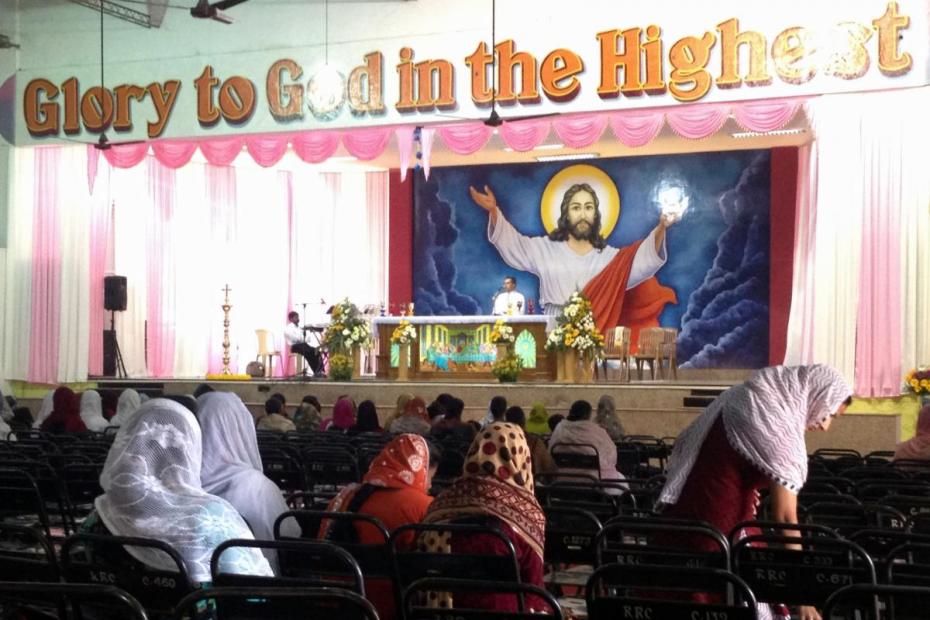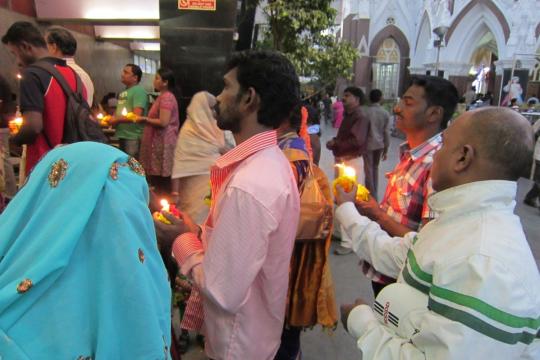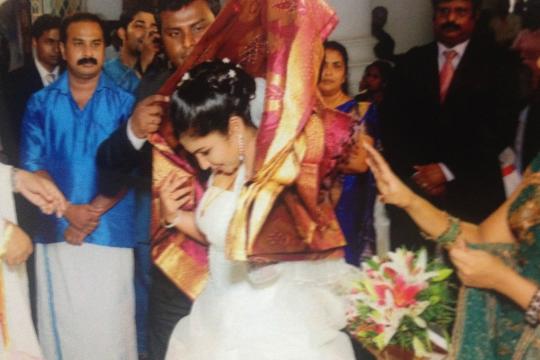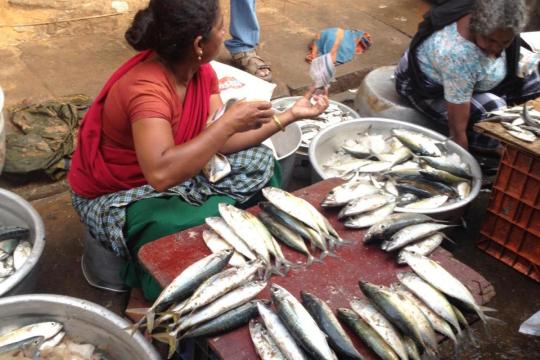Though India has had powerful women in politics, gender segregation in India is more formalized and obvious than in many parts of the world. Trains have “ladies only” carriages, and airport security lines feature separate lines for “ladies." Women do work outside the home in large numbers. Cooking and kitchen life are almost exclusively female roles, and women may stand and serve while male guests eat. In church, women and men generally sit separately, though at times a whole family may sit together.
While husbands are no longer quite the "gods" they were in the past, many Indians say, explicit deference by women is still expected to a remarkable degree, and women are "protected" in many ways. A 2019-20 Pew survey summarized, "nearly nine-in-ten Indians (87%) completely or mostly agree with the notion that 'a wife must always obey her husband.' This includes a majority of Indians (64%) who completely agree with this sentiment. Women are only modestly less likely than men to say that wives should obey their husbands in all situations, and most Indian women express total agreement with this sentiment (61% vs. 67% among men)."1 Whereas about two-thirds of Hindus and Muslims "completely agree" with that notion, 44% of Christians did. 20% of Christians, mostly or completely disagreed, compared to 12% of Hindus and 8% of Muslims. The survey did not differentiate between Catholics nad other Christians.2
Speaking in particular about Syro-Malabar families, though it would apply more broadly, Shiji Varghese argues, “Even though official church teaching considers men and women to be equal, different and complimentary, there is a strong notion that females are inferior… The decision making is given to the male bread winner of the family or even to the male head.” At the same time she claims, it is a truism that “mothers-in-law may rule the house even of a son or daughter-in-law.3
Indian interviewees say that the role of women in the church is at best a nascent concern, and one that is often trivialized. While there are women and men advocating for change, the dominant cultural pressure downplays it as a genuine need. A 2007-8 study of Syro-Malabar Catholics showed that of 22 potential problems and challenges in the way ministry is exercised in the Catholic Church in India, "women being denied their rightful place in the church" ranked lowest as a concern. This is not because women have particular power. While women religious run schools and are successful in many ways, there is still a strong culture of expected deference to men. In the survey, 32% of clergy, 35% of sisters, and 35% of lay Catholics saw this as a "very serious" or "serious" problem in the church. The proportion was far below the issue ranked second from the bottom, "domination of the clergy; laity is denied rightful role in the church." That was regarded as a "very serious" or "serious" problem in the church by 46% of clergy, 43% of sisters, and 59% of lay Catholics.4
Though the number of children in Catholic families may be small, all agree that it is important to make sure that there is a boy among them. A good deal of attention has been drawn to the imbalance of sex ratios in India, tied to sometimes much higher rates for abortion of female fetuses. In Kerala, the most heavily Christian state, there is no imbalance in the sex ratio. Karnataka ranks third in India, and Tamil Nadu 11th.5
In southern Kerala, in Veli, interviewees pointed out several exceptions to the patriarchal culture. Theirs, they say, is a matriarchal society in terms of much house ownership. Women inherit their parents' houses and manage family finances, and fishermen are expected give over their money to their wives to manage.
Homosexuality is taboo in Indian society, and homosexual acts are illegal. Paradoxically, though, transgendered people and eunuchs have a traditional and respected role Indian society. In Bengaluru, one Catholic retreat house held a retreat for transgender youth, something that seems hard to imagine in the West.
At some of the more highly regarded shrines in Kerala, there is apparently a folk wisdom that women should not visit during periods of menstruation, though this is not a value articulated by nuns or clergy, and not something that folk wisdom apparently requires at ordinary churches.6 This practice directly parallels Hindu shrine practice, though it has no official Catholic sanction.
Northeastern Differences
Northeast India, including Meghalaya, is home to a huge number of ethnic groups with their own norms about women and family life. "Mainland" Indians who live there often comment about how completely different the attitudes towards women are among the Khasi and Pnar peoples, whose own systems are matrilineal. There, men and women mix "freely" in ways that are quite different from other Indian norms described above.
- 1Jonathan Evans, e. al., "How Indians View Gender Roles in Families and Society"
- 2All of the top-line data in the above-cited served can be accessed at https://www.pewforum.org/wp-content/uploads/sites/7/2022/03/PF_03.03.22_gender.India_.toplinefinal.pdf.
- 3 Shiji Varghese, “Family, Marriage and Gender roles in the Syro-Malabar rite," lecture at the inaugural Catholics & Cultures international conference, "Catholic Cultures, Indian Cultures: Workshop on Rites, Religiosity, and Cultural diversity in Indian Catholicism," Dharmaram Vidya Kshetram, Bangalore, January 13, 2015.
- 4The survey is summarized in chapter 4, "Life and Ministry of Pastoral Clergy in India: A Scientific Survey" in Paul Parathazham's Christianity in India: Sociological Investigations (Bangalore: Dharmaram Publications, 2013).
- 5Census of India, Office of Registrar General and Census Commissioner, India, 2011. http://censusindia.gov.in/2011-prov-results/paper2/data_files/india/Statement2_RU_Pop&Sexrtaio_State.xls
- 6Corinne Dempsey, Kerala Christian Sainthood: collisions of culture and worldview in South India (New York: Oxford University Press, 2001), 70-72. Her primary informant reported that this was not something priests and nuns countenanced, but “something we [women] all know about and do.”







